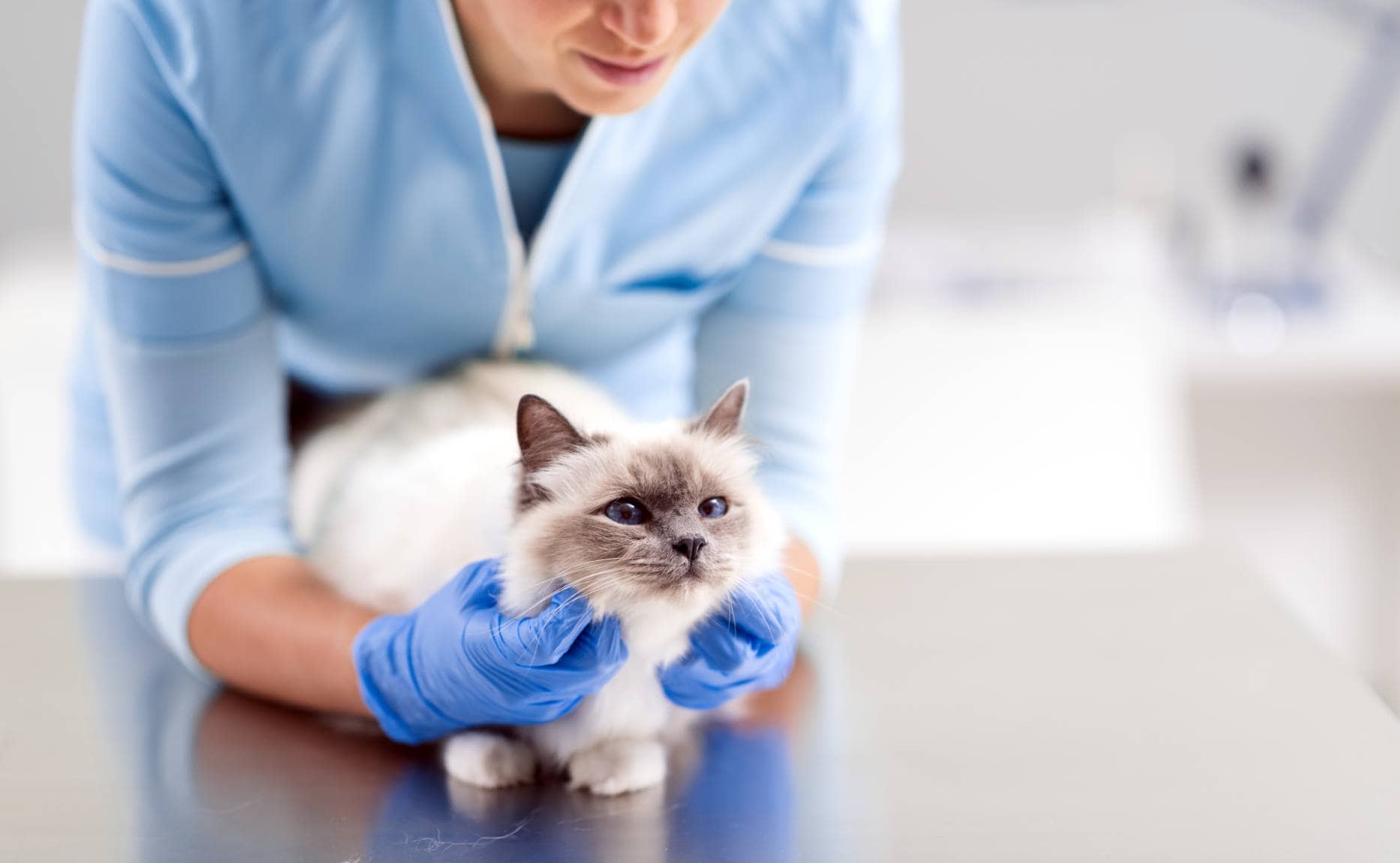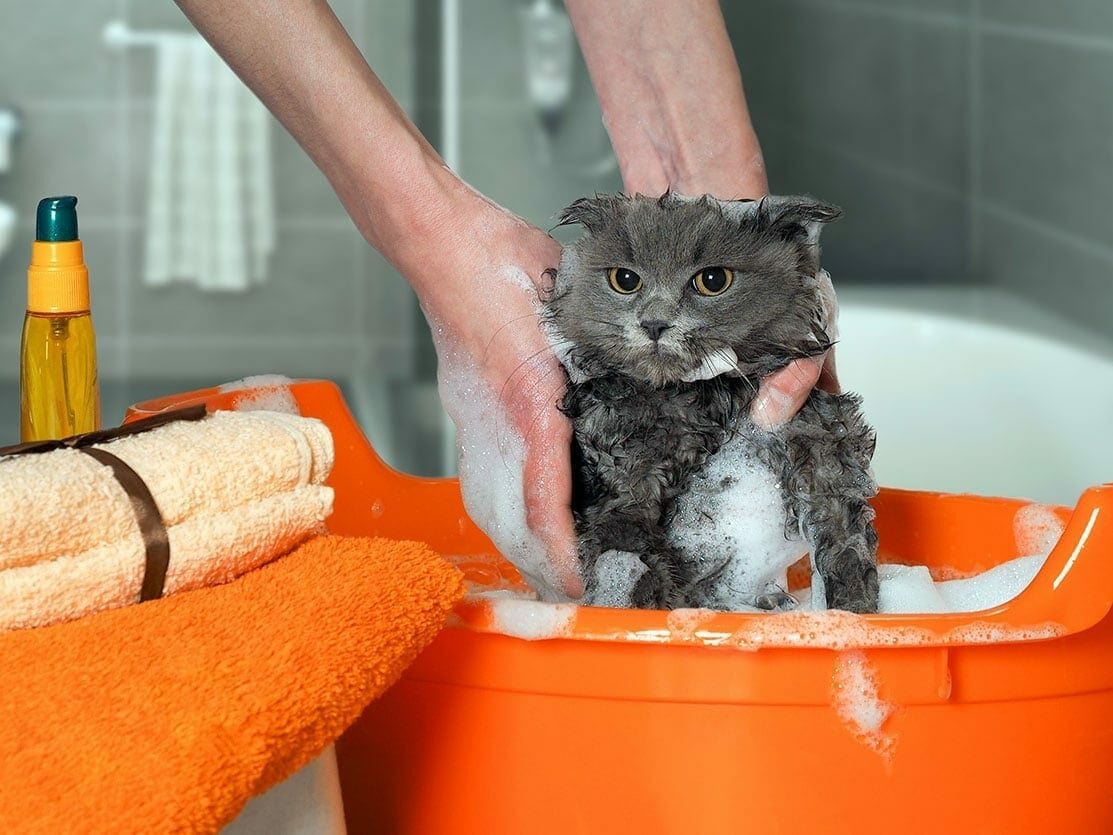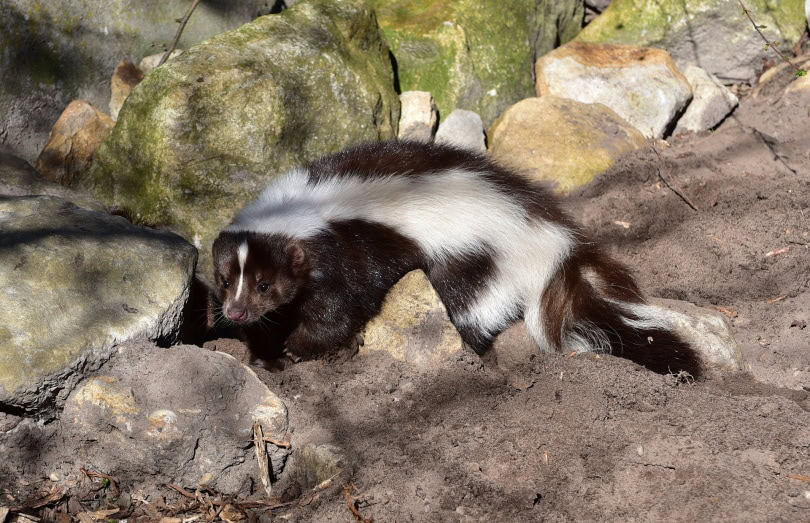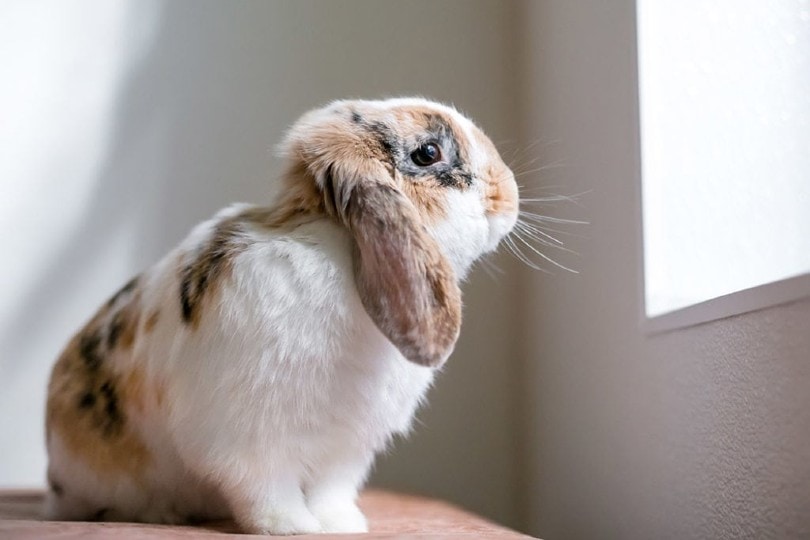VET APPROVED

The information is current and up-to-date in accordance with the latest veterinarian research.
Learn more »Click to Skip Ahead
If you’ve ever been on a backroad late at night, you’ve probably smelled the unmistakable scent of a skunk. The pungent odor overtakes everything in its path. Unfortunately, your cat might be vulnerable to a skunk attack. If you live in an area where skunks are endemic, it’s a good idea to know what to do if your cat gets sprayed. Even if you have an indoor cat, there’s always a chance they’ll slip out an open door or window, so it’s best to be prepared. Here’s what to do if a skunk has sprayed your cat.

Give Your Cat a Thorough Exam
If your cat saunters in smelling like a skunk, the first thing you need to do is examine them thoroughly. This is unpleasant due to the stench, and it’s a good idea to wear thick gloves to keep the smell off your hands. Skunks are generally harmless, peaceful animals. Since their scent is their primary form of protection, they rarely need to do more. However, skunks have claws and teeth, and they know how to use them. If your cat has been sprayed, you need to ensure there are no bites or scratches.
Beware of Infections
Sometimes, bites and scratches can be difficult to spot on our furry friends, so it’s important to monitor your cat for a few days after the skunk incident. The wounds can become infected and form abscesses or systemic infections. It’s also possible for a skunk to transmit rabies to your cat via a bite or scratch, which are not always easily found. Rabies, on the other hand, cannot be transmitted through being sprayed on.
Rabies in Skunks
Skunks, as well as raccoons and foxes, are one of the primary carriers of rabies in North America, so there is always a chance that a wild skunk you encounter may have rabies. Typically, the best course of action is to leave the skunk alone and give it space. If your cat has been in contact with a skunk, you must talk to your vet.
They may want to see your cat for a checkup, especially if your cat is not current on their rabies vaccine. Rabies is a deadly virus, so it’s essential to keep your cat up to date on their rabies vaccine. Rabies vaccines should only be administered by a veterinarian so you can be sure the vaccine is stored and administered correctly.
Talk to Your Vet

Skunk spray can irritate the eyes and mucus membranes, causing squinting and conjunctivitis (if sprayed in the face), irritate the upper airway and lungs (if inhaled by accident), causing sneezing, coughing and drooling, or cause vomiting (if ingested). It’s important to talk to your vet if your cat has any of these signs or respiratory difficulties after a skunk encounter.
The other serious issue that skunk spray can potentially lead to is anemia. This is a rare side effect of exposure to skunk spray, and has so far only been recorded in dogs. Cats’ red blood cells are more sensitive than dogs’ to oxidative damage, so this is something to keep in mind after exposure to a skunk. Anemia can lead to difficulty breathing, lethargy, and loss of appetite. If you notice these signs or notice that your cat’s gums begin to look pale within days of the skunk exposure, take them to the vet immediately.
 Time for a Bath
Time for a Bath

There are several ways to remove the skunk smell, but the primary purpose of all of them is to neutralize the smell. You may hear that some owners cover their cats in tomato juice, but that old standby is not effective at removing the skunk smell. It tends to do little more than mask the smell, leaving your cat smelling like a tomato-flavored skunk.
Cat Bathing Tips
- The first thing you should do if your cat has been sprayed is to gently clean their face and eyes. Use cool water on a soft rag or plain saline eye solution to clean the area. If you’re unsure if the saline solution you have is safe for your cat, just stick to cool water. This cleaning method doesn’t remove the odor or oils from the face, but it will soothe your cat’s irritated eyes and mucus membranes and prevent further irritation from occurring.
- As for thoroughly cleaning the rest of your cat, your best bet is to use a commercial skunk odor remover. They are available at pet stores and farm supply stores and are formulated specifically to neutralize the skunk odor while still being safe for pets. These products cannot be used near your cat’s eyes. You may find a skunk odor remover shampoo or a “homemade” skunk odor remover mixture from your veterinarian.
- In lieu of a commercial skunk odor remover, you can make a shampoo at home. You should not mix these ingredients together in a closed bottle, so it’s a good idea to find a bucket to use or to mix it in a sink or bathtub. Combine 1 quart of 3% hydrogen peroxide, ¼ cup of baking soda, and 1 teaspoon of dish soap. The blue Dawn dish soap is generally recommended because it is mild and gentle on the skin. Mixing baking soda and hydrogen peroxide together will result in a chemical reaction, which is why this mixture should be made in an open container. Otherwise, you’ll end up with an exploding mess.
- Using the skunk odor remover or your homemade shampoo mixture, gently bathe your cat. Don’t allow the mixture to stay on the coat and skin for more than a couple of minutes, as it can be drying and irritating if left on. If needed, you can rinse and repeat multiple times instead of leaving the solution sitting on your cat’s coat. Bathing your cat with this solution is ideal, but for uncooperative kitties, you may just have to do a sponge bath, wiping with a clean, damp washcloth between sessions. You may have to repeat the bath multiple days in a row to entirely eliminate the smell.
Why Do Skunks Stink?
Like dogs and cats, skunks have anal glands. They are small sacs located on either side of the anus. In dogs and cats, you may notice a fishy smell if they express their anal glands. Skunks, on the other hand, excrete an oily substance that contains thiols, which are sulfuric compounds that also account for the rotten egg smell associated with sulfur. The oiliness of the spray makes it difficult to clean off, and an animal that has been sprayed in the face may have a difficult time getting rid of the smell on their own. It can also lead to irritation of the eyes and mucus membranes.

How to Avoid Skunks
Skunks are considered nocturnal animals, which means they are most active before dawn and after dusk. They will be out and about throughout much of the nighttime hours, but you are most likely to have a skunk encounter at dawn or dusk. Keeping your cat indoors is the best way to avoid interactions with skunks. If your cat goes outside, it’s best to only allow them outside during daylight hours.
Although you are most likely to encounter a skunk outside of daylight hours, a skunk interaction is sometimes unavoidable. Sick, injured, and orphaned skunks may be out during the daytime. If you spot a skunk out during the daytime, you should contact your local animal control office so that they can capture and evaluate the skunk.
Conclusion
Avoiding skunks and keeping your cat indoors is the best way to prevent skunk interactions. However, it’s good practice to be prepared in case a skunk incident occurs. Cats are naturally curious and some may even see a skunk as a threat, so it’s not uncommon for cats to be sprayed, and it occurs less often in cats than it does in dogs. When it comes to removing the skunk smell from your cat, your best resource will always be a veterinarian. Commercial skunk odor removers are a great option, but when they aren’t available, you can make your own mixture at home with simple ingredients you can pick up at the drugstore. Alongside getting sprayed by a skunk, there is a risk your cat may have been bitten or scratched, which isn’t always obvious at first, so speak to your veterinarian about rabies prevention and wound management.
- Next on your reading list: Dog Sprayed by Skunk? Here’s What to Do (Vet Approved)
Featured Image Credit: Geoffrey Kuchera, Shutterstock











